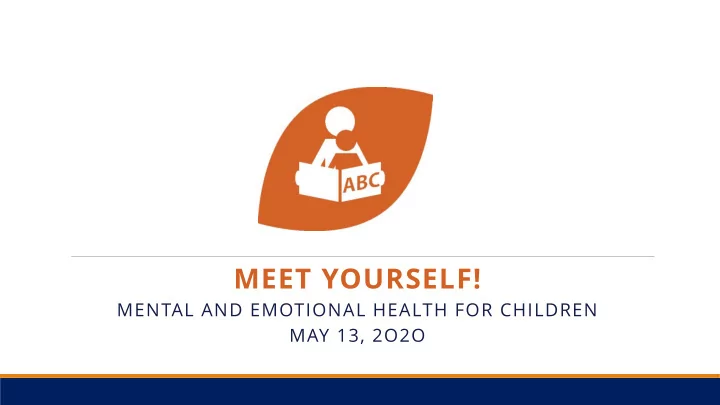

MEET YOURSELF! MENTAL AND EMOTIONAL HEALTH FOR CHILDREN MAY 13, 2O2O
What is First Steps? A network of organizations and individuals that provide programs, services, and opportunities for our region’s young children, their parents, and their caregivers. Our shared priorities: 1. Increase knowledge about and access to available services through an early childhood education and development information hub . 2. Identify shared values and messaging so agencies can speak with a common voice about the importance of early childhood. 3. Support and strengthen the early childhood education and development workforce through professional development, recognition, and compensation.
Our Speakers • Meagan Pratt – Guidance Counselor, Pulaski County High School • Dr. Florence Mogen – Physician, NRV Pediatrics • Rebecca Moore – Trauma Informed Trainer and Integrative Health Liaison, NRV Community Services A Couple Requests: • Please mute your microphone • Type questions for the speakers in the Chat
LIGHTNING ROUND!
Lightning Round Meagan Pratt Pulaski County High School
Lightning Round Dr. Florence Mogen NRV Pediatrics
Florence H. Mogen, MD; FAAP NRV Pediatrics 202 8 th Street, Radford VA 24141 540-639-5188
Centers for Disease Control: https://www.cdc.gov/coronavirus/2019- ncov/daily-life-coping/talking-with-children.html Resources for BrainPOP: Coronavirus (4-minute video, activities, and games) providers and families on Sesame Street : https://www.sesamestreet.org/caring COVID-19 and National Public Radio: Just for Kids: A Comic Exploring the New staying Coronavirus healthy PBS Kids: How to Talk to Your Kids About Coronavirus (includes a list of videos, games, and activities about handwashing and staying healthy at the bottom of the article)
Lightning Round Rebecca Moore New River Valley Community Services
Supporting our children through a Pandemic: Impacts of COVID-19 & strategies to help heal Rebecca Moore, MA, QMHP-C/A New River Valley Community Services Integrative Health Liaison & Trauma Informed Trainer
What is trauma? Individual trauma results from an event , series of events, or set of circumstances that is experienced by an individual as physically or emotionally harmful or life threatening and that has lasting adverse effects on the individual’s functioning and mental, This is a physical, social, emotional, or spiritual well-being. (SAMHSA, 2014) universally traumatic time Trauma is also the loss of any of the following: for everyone -boundaries - power and control - attachment -safety - protection - innocence - trust -possession -consistency/predictability -sense of self/body image
Things to consider Age of child Natural supports of the family Economic supports of the family How are Coping style prior to pandemic children Resiliency Skills responding? Predisposition/Previously diagnosed MH issues Access to resources
Increased anxiety COMMON Increased fear=irritability, anger, tantrums TRENDS Increase in behavioral problems Confusion *not much Difficulty with transitions different from Trouble learning and retaining new information adult Changes in typical behavior (difficulty sleeping, sleeping excessively, difficulty eating, eating more then usual, increase in counterparts energy, desire for more comfort, or increase in isolation)
How can we help? • Transparency • Resiliency Skill Building • Self-Care
Transparency Important to have AGE APPROPRIATE conversations with children Allow for questions Create space to listen to their fears and concerns (you don’t know where they are getting information from and often times they overhear adults in the household discussing their own fears which creates anxiety and fear for them) It’s okay to not have all of the answers and to be honest about that Identify ways that as a household you are working to stay safe and take care of one another.\
Create Routines/predictability Have as much consistency as possible in the household Identify things that you can control vs. can’t control -productive vs. unproductive worry Resiliency Skill Model behaviors for your children Teach and communicate emotions Building Lets kids know its okay to have tough days and the importance of reaching out for support when that is occurring Create support systems and utilize them when needed Identify roles and responsibilities in the home to help each other
Awareness Balance Connection Creating “self - care centers” Self-Care Encouraging time for play as well as work Model good self-care Take breaks Keep expectations reasonable Monitor media exposure
Remember you are not in this alone and there are many resources available to help support family’s and individuals during this time to include but not limited too: ACCESS Phone Number: 961-8400 Pediatricians Reach out for NRV Cares Health Department help Women’s Resource Center CHIP Churches Private Out-Patient Providers
Upcoming Sessions • May 27 th - Mental and Emotional Health for Adults • June 10 th – Providing Services and Communicating with Clients Remotely Visit cfnrv.org/events to register!
THANK YOU! FIRST STEPS: EARLY EDUCATION & DEVELOPMENT NETWORK
Recommend
More recommend